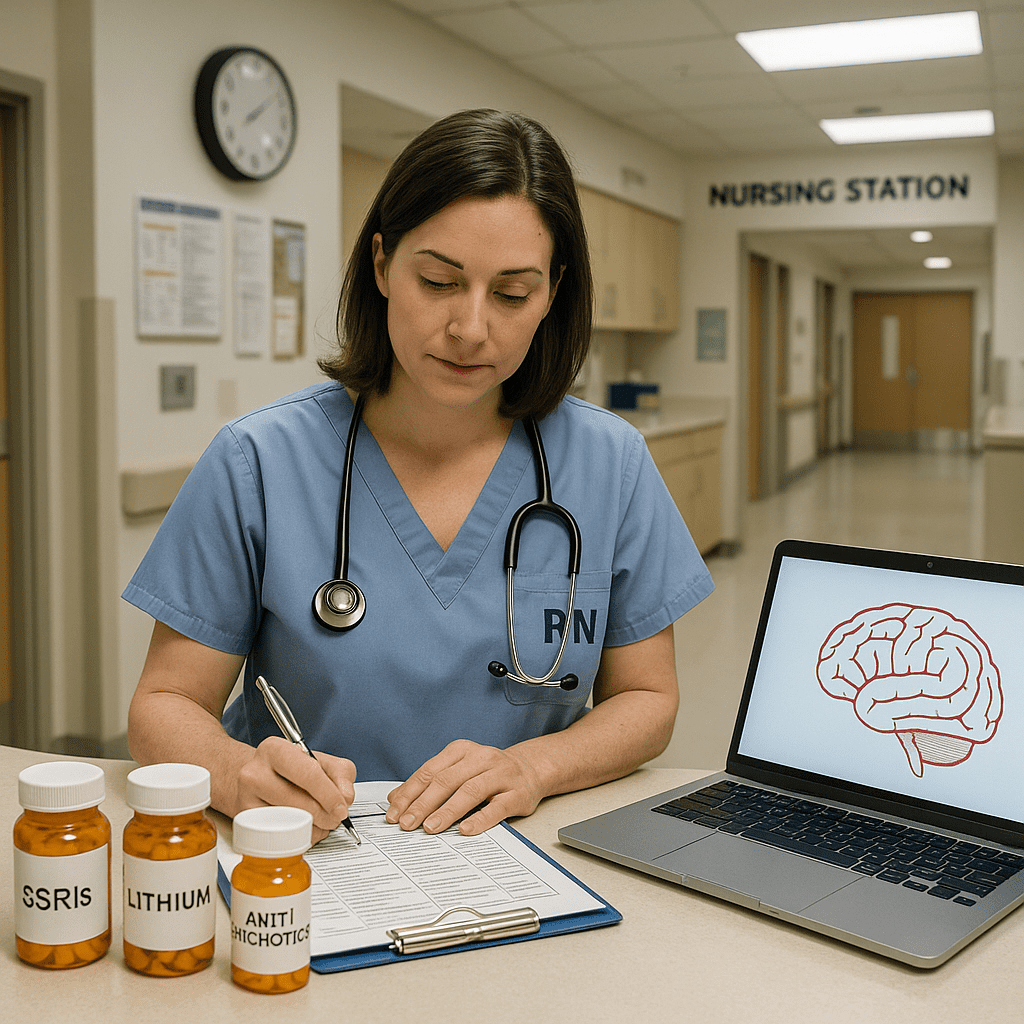Psychotropic medications are essential in treating mental health disorders such as depression, anxiety, bipolar disorder, and schizophrenia. Every registered nurse (RN) must understand how these drugs work, their side effects, and how to monitor patients safely — both for NCLEX success and real-world practice.
💊 What Are Psychotropic Medications?
Psychotropic medications are drugs that affect brain chemistry and alter mood, behavior, or perception. As a nurse, it’s crucial to recognize the major classes and their common nursing considerations. On the NCLEX, questions often test your understanding of side effects, patient safety, and teaching points.
⚖️ Major Classes of Psychotropic Medications
1. Antidepressants
Used for depression and anxiety disorders, these medications increase neurotransmitters like serotonin and norepinephrine.
Common Types:
- SSRIs (Selective Serotonin Reuptake Inhibitors): fluoxetine, sertraline, paroxetine
- SNRIs: venlafaxine, duloxetine
- Tricyclics: amitriptyline, nortriptyline
- MAOIs: phenelzine, tranylcypromine
🩺 Nursing Tips:
- Monitor for suicidal thoughts when therapy begins.
- Teach patients to avoid tyramine-rich foods with MAOIs (risk of hypertensive crisis).
- SSRIs may cause sexual dysfunction and serotonin syndrome.
- Never stop suddenly — taper doses gradually.
2. Antipsychotics
Used for schizophrenia, bipolar disorder, and psychosis. These medications help control hallucinations, delusions, and disorganized thinking.
Common Types:
- Typical: haloperidol, chlorpromazine
- Atypical: risperidone, olanzapine, quetiapine
🩺 Nursing Tips:
- Monitor for extrapyramidal symptoms (EPS) — dystonia, akathisia, tardive dyskinesia.
- Watch for neuroleptic malignant syndrome (NMS) — muscle rigidity, fever, altered mental status.
- Encourage regular WBC monitoring for clozapine due to agranulocytosis risk.
- Educate patients to avoid alcohol and rise slowly to prevent orthostatic hypotension.
3. Mood Stabilizers
Primarily used for bipolar disorder to control manic and depressive episodes.
Common Types:
- Lithium carbonate
- Valproic acid
- Carbamazepine
- Lamotrigine
🩺 Nursing Tips:
- Monitor lithium levels (0.6–1.2 mEq/L therapeutic range).
- Signs of toxicity: tremor, confusion, vomiting, diarrhea.
- Maintain consistent salt and fluid intake — dehydration increases toxicity.
- For anticonvulsants like valproic acid, monitor liver function and platelet counts.
4. Anxiolytics
Used for anxiety, insomnia, and acute agitation.
Common Types:
- Benzodiazepines: lorazepam, alprazolam, diazepam
- Non-benzo: buspirone (non-sedating, non-addictive)
🩺 Nursing Tips:
- Benzos cause sedation and dependence — short-term use only.
- Teach patients no alcohol or driving while taking them.
- Buspirone takes 2–4 weeks to reach full effect — not for acute anxiety.
5. Stimulants
Used mainly for ADHD and narcolepsy.
Common Types:
- methylphenidate, amphetamine salts (Adderall)
🩺 Nursing Tips:
- Monitor growth in children — can suppress appetite.
- Administer in the morning to avoid insomnia.
- Teach parents about potential for abuse and tolerance.
🧩 Nursing Priorities with Psychotropic Medications
- Monitor Side Effects and Labs: Always assess for life-threatening complications like NMS, serotonin syndrome, or lithium toxicity.
- Ensure Safety: Prevent falls, sedation, and orthostatic hypotension.
- Educate Patients: Emphasize medication adherence and gradual discontinuation.
- Therapeutic Communication: Use empathy and active listening, especially in patients with psychiatric symptoms.
- NCLEX Tip: Remember — safety first! If a medication increases fall or suicide risk, prioritize observation and safety measures.
🧠 Why Nurses Must Know Psychotropic Medications
For every registered nurse, understanding psych meds ensures both safe nursing practice and NCLEX readiness. Questions often focus on side effect recognition, teaching priorities, and crisis prevention.
In clinical settings, nurses are the first to identify changes in mood, cognition, or behavior, making this knowledge vital for quality care.
📘 Final Thoughts
Psychotropic medications require vigilance, compassion, and critical thinking — skills every RN nurse must master. Whether you’re preparing for the NCLEX or practicing on the floor, knowing your drug classes, side effects, and safety priorities can literally save lives.
If you’re a nursing student, check out the Mental Health Nursing Bundle — a comprehensive resource covering psych meds, disorders, and care strategies for confident clinical performance.
🩺 FAQ: Psychotropic Medications
Psychotropic medications are drugs that affect a person’s mood, behavior, or thinking. Common classes include antidepressants, antipsychotics, anxiolytics, and mood stabilizers. Every nurse and RN nurse must understand their effects and side effects to provide safe and effective care.
Psychotropic medications frequently appear on the NCLEX because they require careful monitoring and patient teaching. Nursing students must know the major drug classes, key side effects like tardive dyskinesia or serotonin syndrome, and safety precautions such as monitoring for suicidal ideation.
The registered nurse must:
Assess mental status and mood changes.
Monitor vital signs and side effects.
Educate patients about adherence and avoiding abrupt withdrawal.
Evaluate therapeutic effects regularly.
These points are essential for both clinical practice and NCLEX success.
A nursing bundle focused on mental health or pharmacology offers structured study guides, visual charts, and quick reference sheets that help nursing students and RN nurses retain critical medication information faster and with more confidence.
Some common examples include:
SSRIs: fluoxetine, sertraline
Mood stabilizers: lithium, valproic acid
Antipsychotics: haloperidol, risperidone
Anxiolytics: lorazepam, diazepam
Each drug class has specific nursing implications, which are crucial for patient safety and NCLEX review.

